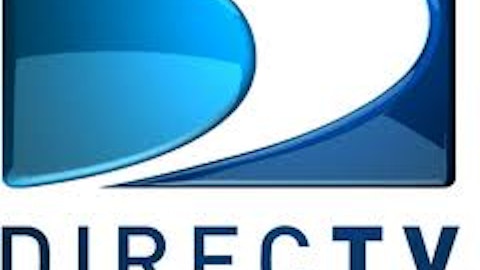
Stronghold in Latin America
DirecTV’s domestic business has a poor outlook, which is likely why the stock trades at just 13 times trailing earnings despite high growth overseas. The domestic market is completely saturated, with competitors like DISH Network (NASDAQ:DISH) and even cable companies like Time Warner Cable Inc (NYSE:TWC) putting a low ceiling on DIRECTV (NASDAQ:DTV)’s growth in the United States. The best that the company can hope for is to retain a large portion of its current customers, as adding new ones will be a difficult task.
There are two ways that satellite providers, like DirecTV and DISH, and cable companies, like Time Warner Cable Inc (NYSE:TWC), can generate additional growth in the years ahead: (1) branch out into new businesses within the United States, or (2) reproduce their domestic business internationally. DISH and Time Warner chose the former, while DIRECTV (NASDAQ:DTV) wisely chose the latter.
DISH is a low-cost provider of satellite television, which should prove valuable amid stagnant growth. The company, which focuses on providing low-priced satellite to cost-conscious customers, would benefit from a merger with DirecTV, which earns higher margins via its higher-priced offering. But, DISH has made itself unattractive by diversifying its operations into the notoriously competitive domestic wireless market. As a result, the company is unlikely to produce meaningful growth over the next few years.
Like DISH, Time Warner Cable Inc (NYSE:TWC) is committed to remaining a U.S.-centric business. The company is more diversified than DIRECTV (NASDAQ:DTV) — it offers high-speed Internet and phone service in addition to its cable television offering. But, Time Warner Cable suffers from the same pressure that is hampering DirecTV’s domestic growth; its cable TV business suffers from the increasing number of online options for streaming television in addition to a saturated market, while its phone service business will likely disappear over the next decade due to the smartphone revolution.
Fortunately for its investors, DIRECTV (NASDAQ:DTV) has chosen to focus its investments in Latin America. The company’s first-mover advantage in the region has enabled it to grow to scale much faster than if there were serious competitors, and it effectively controls the satellite television market. This initial dominance will likely give it an insurmountable lead in the region, enabling it to earn high margins and outsized returns on invested capital. While its competitors struggle to produce growth in the United States, DirecTV will be growing for years in Latin America.
A clear mispricing
DIRECTV (NASDAQ:DTV) trades at 13x earnings, the same multiple as Time Warner Cable Inc (NYSE:TWC). DISH trades at 35x, but investors should not count on a large recovery in earnings power over the next few years.
While Time Warner Cable Inc (NYSE:TWC) has growth to spare in its Internet division, its cable TV and phone businesses will continue to decline. In contrast to DirecTV’s growing Latin American segment, it is anyone’s guess how the two stocks can trade at the same earnings multiples.
Investors who side with Berkshire will likely do much better than the market, while the shorts will get steamrolled as the value of DIRECTV (NASDAQ:DTV)’s Latin American segment becomes apparent to the market.
Ted Cooper has no position in any stocks mentioned. The Motley Fool recommends DirecTV.
The article DirecTV Bears Will Get Slaughtered originally appeared on Fool.com.
Ted is a member of The Motley Fool Blog Network — entries represent the personal opinion of the blogger and are not formally edited.
Copyright © 1995 – 2013 The Motley Fool, LLC. All rights reserved. The Motley Fool has a disclosure policy.



